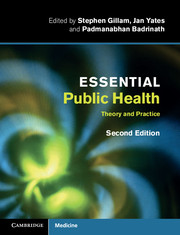Book contents
- Frontmatter
- Contents
- Contributors
- Foreword to the second edition
- Foreword to the first edition
- Foreword to the first edition
- Acknowledgements
- Introduction
- Part 1 The public health toolkit
- Part 2 Contexts for public health practice
- Introduction to Part 2 – what do we mean by contexts in public health?
- 12 The health of children and young people
- 13 Adult public health
- 14 Public health and ageing
- 15 Health inequalities and public health practice
- 16 Health policy
- 17 International development and public health
- 18 Sustainable development – the opportunities and the challenges for the public’s health
- Glossary
- Index
- References
14 - Public health and ageing
Published online by Cambridge University Press: 05 August 2012
- Frontmatter
- Contents
- Contributors
- Foreword to the second edition
- Foreword to the first edition
- Foreword to the first edition
- Acknowledgements
- Introduction
- Part 1 The public health toolkit
- Part 2 Contexts for public health practice
- Introduction to Part 2 – what do we mean by contexts in public health?
- 12 The health of children and young people
- 13 Adult public health
- 14 Public health and ageing
- 15 Health inequalities and public health practice
- 16 Health policy
- 17 International development and public health
- 18 Sustainable development – the opportunities and the challenges for the public’s health
- Glossary
- Index
- References
Summary
Key points
The population of older people has been increasing in number and as a proportion of populations worldwide.
The prevalence of physical and cognitive frailty increases with age and as a result older people develop disabilities that prevent them from living independently as they age.
Primary, secondary and tertiary prevention strategies can be effective for specific conditions that are common among older people.
Where the scope for prevention is limited, as for example in dementia, provision needs to be made to provide support through health and social care.
Informal carers, who are often relatives, provide the majority of social care for older people with more formal arrangements possibly becoming necessary as disability levels or health status deteriorate.
Policy responses to ageing populations need to promote independent living, financial and physical security, as well as health- and social-care provision, in order to encourage older people to be active participants in society.
Introduction
At the start of the twentieth century a child born in the United Kingdom could expect to live for less than 50 years. In the UK, life expectancy at birth was 77.7 years for males and 81.9 years for females in 2009. This substantial change, typical of other developed countries, could well be seen as proof of the triumph of public health (broadly defined); but the success has also brought challenges.
- Type
- Chapter
- Information
- Essential Public HealthTheory and Practice, pp. 244 - 256Publisher: Cambridge University PressPrint publication year: 2012

